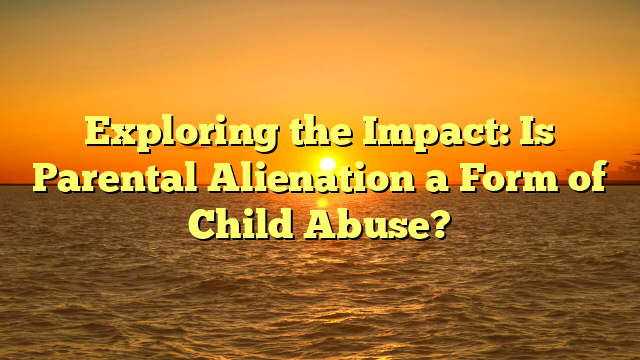Exploring the Impact: Is Parental Alienation a Form of Child Abuse?
Introduction
Parental alienation is a controversial topic that has gained significant attention in recent years. It refers to a situation where one parent manipulates a child’s perception of the other parent, leading to the child rejecting or showing hostility towards the targeted parent. This phenomenon has raised concerns about its potential impact on children and whether it should be considered a form of child abuse. In this article, we will explore the impact of parental alienation and discuss whether it meets the criteria for child abuse.
Understanding Parental Alienation
Parental alienation typically occurs in high-conflict divorce or separation cases, where one parent seeks to undermine the relationship between the child and the other parent. The alienating parent may engage in various tactics, such as badmouthing the targeted parent, limiting contact, or manipulating the child’s emotions. Over time, the child may develop negative feelings towards the targeted parent, leading to a strained relationship or complete rejection.
Signs of Parental Alienation
Recognizing parental alienation can be challenging, as it often involves subtle behaviors that may go unnoticed. However, some common signs include:
- Consistent negative comments about the targeted parent in the child’s presence
- Interference with visitation or communication between the child and targeted parent
- Encouraging the child to reject or show hostility towards the targeted parent
- Creating a sense of fear or guilt in the child when expressing positive feelings towards the targeted parent
The Impact on Children
Parental alienation can have significant emotional and psychological consequences for children. The child may experience confusion, loyalty conflicts, and a sense of loss due to the strained relationship with the targeted parent. In severe cases, the child may develop anxiety, depression, or even exhibit self-destructive behaviors.
Long-Term Effects
The effects of parental alienation can extend into adulthood, impacting the child’s ability to form healthy relationships and trust others. Research suggests that individuals who have experienced parental alienation may struggle with intimacy, have difficulty regulating emotions, and exhibit higher rates of mental health disorders.
Is Parental Alienation Child Abuse?
The classification of parental alienation as child abuse is a topic of debate among professionals in the field. While some argue that it meets the criteria for emotional abuse, others believe that it falls under the umbrella of psychological manipulation rather than direct abuse.
Arguments in Favor
Supporters of classifying parental alienation as child abuse argue that it inflicts emotional harm on the child by undermining their relationship with the targeted parent. They believe that intentionally manipulating a child’s perception of a parent can have long-lasting negative effects on their well-being, making it a form of abuse.
Counterarguments
Opponents of labeling parental alienation as child abuse contend that it may be more appropriate to categorize it as psychological manipulation or coercive control. They argue that the term “abuse” should be reserved for cases involving physical harm or neglect, and that parental alienation, while harmful, does not meet these criteria.
Legal Implications
The classification of parental alienation as child abuse can have significant legal implications. In some jurisdictions, courts may consider parental alienation when making custody and visitation decisions. Accusations of parental alienation can impact the targeted parent’s rights and may result in supervised visitation or limited contact with the child.
Challenges in Court
Proving parental alienation in court can be challenging, as it often relies on subjective evidence and the child’s willingness to disclose their true feelings. Courts must carefully evaluate the evidence presented and consider the best interests of the child when making decisions regarding custody and visitation.
Conclusion
Parental alienation is a complex issue with far-reaching consequences for children and families. While it is clear that parental alienation can have a detrimental impact on children, the classification of it as child abuse remains a topic of debate. Regardless of the label, it is crucial to address and mitigate the effects of parental alienation to ensure the well-being of children caught in these situations.
References
1. Baker, A. J. L. (2010). Adult recall of parental alienation in a community sample: Prevalence and associations with psychological maltreatment. Journal of Divorce & Remarriage, 51(1), 16-35.
2. Harman, J. J., Kruk, E., & Hines, D. A. (2016). Parental alienating behaviors: An unacknowledged form of family violence. Psychological Bulletin, 142(6), 556-579.
3. Warshak, R. A. (2015). Ten parental alienation fallacies that compromise decisions in court and in therapy. Professional Psychology: Research and Practice, 46(4), 235-249.
